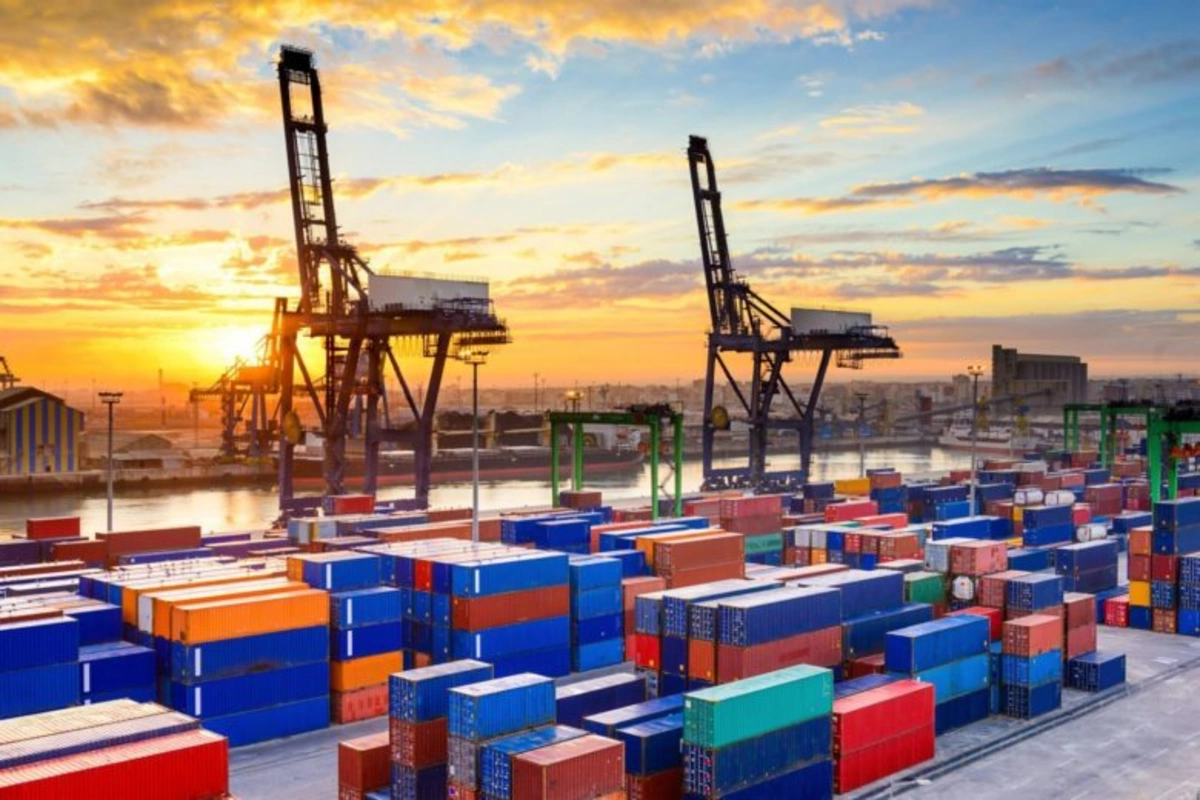
Google images
Azerbaijan, Kazakhstan, and China have embarked on a significant project in the Caspian region, to establish an intermodal cargo terminal at the Baku International Sea Trade Port in Alat. The terminal is expected to significantly increase container train volumes along the China-Europe-China route via the Trans-Caspian International Transport Route (TITR, also known as the Middle Corridor). It will reduce transportation costs and streamline cargo handling times, The Caspian Post reports citing foreign media.
The project is both timely and overdue, given the rapidly growing freight traffic along the TITR. On December 3, the 300th container block train from China to Azerbaijan via Kazakhstan was dispatched along this route. According to Azerbaijan Railways CJSC, the volume of cargo transported along the TITR from China has exceeded 27,000 twenty-foot equivalent unit (TEU) containers this year, a 25-fold increase compared to the same period last year.
This growth highlights the rising interest of shippers in the Middle Corridor as a vital route connecting China to Europe through Kazakhstan and Azerbaijan. It also underscores the urgent need to expand existing port infrastructure and build new facilities capable of handling increasing cargo volumes.
Plans for 2025-2026 include tripling the number of block trains from China to Europe, with a goal of reaching 1,000 trains by 2027. Furthermore, freight shipments in the opposite direction have begun; on November 24, the first export block train from Baku to Xi"an, consisting of 62 forty-foot containers, was dispatched. By year"s end, 600 containers carrying 15,000 tonnes of export cargo are expected to be shipped.
Terminal project
The agreement to establish the new intermodal cargo terminal was signed on November 12, during the 29th session of the Conference of the Parties to the UN Framework Convention on Climate Change (COP29) in Baku.
The agreement was signed by director general of Baku Port Taleh Ziyadov, chairman of the board of Kazakhstan Railways (KTZ) Nurlan Sauranbayev and Yuan Xiaojun, director general of Xi"an Free Trade Port Construction and Operation Co., Ltd. The ceremony was attended by Ruslan Alikhanov, director general of Azerbaijan Investment Holding, and Nurlan Zhakuov, chairman of the board of Samruk-Kazyna.
The terminal will become key infrastructure for handling various types of cargo using multimodal transport, including sea, rail and road. Initially planned to cover an area of 40 hectares, the project includes the construction of a universal cargo yard, a covered warehouse spanning 5,000 square metres, and a container yard with a capacity of over 1,000 containers. The terminal will adhere to modern logistics standards, emphasising digital technologies and process standardisation.
Goals in alignment
The terminal project is not only relevant to Azerbaijan and China but also crucial for Kazakhstan. As noted by Kazakh media, the establishment of a new hub in Azerbaijan aligns with Kazakhstan"s Railway Transport Development Concept, which includes the development of the TITR as a key component. The concept, adopted in mid-2024, outlines plans to build a network of cargo terminals and container hubs within Kazakhstan and abroad.
The project involves the Kazakhstan-Azerbaijan SK-AIH Investment Fund, Kazakhstan Railways, Baku International Sea Trade Port and Xi"an Free Trade Port Construction and Operation. The ownership structure reflects a commitment to equitable cooperation, with SK-AIH Investment Fund holding a 10% stake, and the other three participants each holding 30%.
While exact project timelines and costs remain undisclosed, the stakeholders aim to complete the terminal promptly, given the critical need for its capacities to support efficient freight operations. The infrastructure being developed in Alat will mark a significant step in the Middle Corridor"s evolution, strengthening economic cooperation between Azerbaijan, China, and Kazakhstan.
Trade artery
The Baku International Sea Trade Port is the largest port on the Caspian Sea. Speaking at COP29, Ziyadov highlighted that the port is entering the second phase of construction, focused on creating infrastructure for container transportation. The first phase enabled a throughput capacity of 15mn tonnes, while the second phase aims to increase this capacity to 25mn tonnes, primarily emphasising container freight.
Ziyadov underscored the importance of the new intermodal cargo terminal in this context. "Cargo from China and Kazakhstan to Europe will pass through our port and be delivered to their destinations via rail and road through the new terminal. The terminal will also offer storage facilities. Kazakhstan"s export potential through our port is approximately 4mn tonnes. Cargo volumes from China to Europe are expected to grow from 100,000 to 300,000 containers," he said.
The terminal is poised to become a pivotal part of the Middle Corridor, addressing the increasing demand for efficient cargo transportation between China, Central Asia and Europe. Its advanced infrastructure and multimodal capabilities will streamline trade routes, reduce transit times and optimise costs, making it an attractive option for global logistics companies.
Construction of the terminal will not only enhance the Middle Corridor"s capacity but also foster stronger economic ties among its participants.
The collaboration between Azerbaijan, Kazakhstan, and China in setting up the terminal highlights the strategic importance of the Middle Corridor as an alternative to traditional shipping routes. For Azerbaijan, the terminal will solidify its position as a vital logistics hub in the Caspian region, while Kazakhstan will gain a significant boost in its role as a key transit country connecting Asia and Europe. For China, the development of such infrastructure ensures reliable and diversified trade routes for its goods heading westward.
Furthermore, the terminal"s integration into the broader Eurasian logistics network will foster economic development not only for the participating countries but also for neighbouring regions. By facilitating the movement of goods with greater efficiency, the project will attract new investments, strengthen interregional ties, and contribute to the sustainable growth of the Middle Corridor as a critical artery for global trade.
Share on social media
